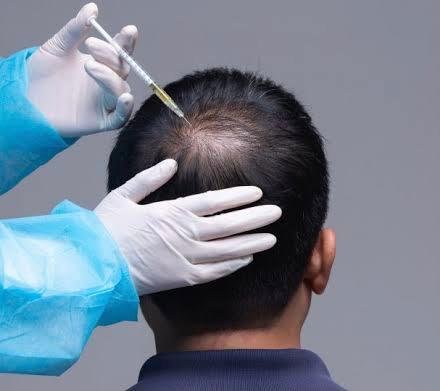It’s no secret that stress can take a toll on your body—but what about your hair? If you’ve ever noticed more strands in your brush or shower drain during tough times, you’re not imagining it. Scientific research confirms that stress can, in fact, cause hair loss in men.
In this post, we break down the connection between stress and hair loss, the types of stress-related shedding, and what you can do to protect your hair and scalp health.
Understanding the Stress-Hair Loss Connection
Stress impacts the body in numerous ways—triggering hormonal changes, increasing inflammation, and disrupting vital bodily functions. These effects can extend to the hair growth cycle, which has three main phases:
- Anagen (Growth Phase)
- Catagen (Transitional Phase)
- Telogen (Resting/Shedding Phase)
Chronic or acute stress can push hair prematurely into the telogen phase, leading to noticeable shedding—a condition known as telogen effluvium.
Types of Stress-Related Hair Loss in Men
1. Telogen Effluvium
This is the most common form of stress-induced hair loss. It typically occurs 2–3 months after a significant physical or emotional stressor, such as:
- A serious illness or infection (e.g., COVID-19)
- Major surgery or trauma
- Divorce or loss of a loved one
- Financial or career stress
- Sudden dietary changes or malnutrition
Symptoms:
- Diffuse thinning across the scalp
- Excess hair in the shower, pillow, or comb
- Hair loss of up to 300 strands per day
Is it permanent?
No. Telogen effluvium is usually temporary, and hair regrowth often begins within 6–9 months once the trigger is resolved.
2. Alopecia Areata
This autoimmune condition can be triggered or worsened by severe stress. The immune system attacks hair follicles, resulting in patchy bald spots on the scalp or face.
Symptoms:
- Sudden, round patches of complete hair loss
- May occur on the scalp, beard, or eyebrows
- Sometimes tingling or itching in affected areas
Is it permanent?
It varies. In many cases, hair regrows on its own, but treatments like corticosteroids or immunotherapy may be needed.
3. Trichotillomania (Hair-Pulling Disorder)
This is a psychological condition where individuals feel a compulsive urge to pull out their hair, often as a way to cope with stress, anxiety, or boredom.
Symptoms:
- Irregular or broken hairs
- Bare patches with visible signs of pulling
- Often accompanied by feelings of guilt or shame
Is it permanent?
With psychological treatment (CBT, behavioral therapy), the behavior can be managed, and hair often regrows over time.
What the Research Says
Several peer-reviewed studies confirm the link between stress and hair loss:
- Harvard Medical School (2021): Found that chronic stress elevates levels of cortisol, which shortens the hair growth cycle and prevents stem cells in hair follicles from regenerating.
- Journal of Investigative Dermatology (2013): Identified that stress-induced inflammation can disrupt the normal function of the hair follicle.
- Dermatologic Clinics (2020): Highlighted that post-traumatic stress and systemic illness (like COVID-19) are frequent triggers of telogen effluvium in men.
Diagnosis and When to See a Specialist
If you’re experiencing unexpected or excessive hair loss, especially after a stressful event, it’s time to:
- Consult a dermatologist or trichologist
- Rule out underlying causes like thyroid issues, nutritional deficiencies, or male pattern baldness
- Get blood work if necessary
An accurate diagnosis ensures proper treatment and peace of mind.
Treatment Options for Stress-Related Hair Loss
1. Address the Underlying Stress
- Practice mindfulness, meditation, or yoga
- Improve sleep quality
- Consider therapy or counseling
- Avoid alcohol, smoking, or excessive caffeine
2. Topical or Oral Treatments
- Minoxidil (Rogaine): Can be used to stimulate regrowth during the recovery phase.
- Nutritional Supplements: Biotin, iron, vitamin D, and zinc may support healthy regrowth.
3. Scalp Health & Gentle Hair Care
- Use mild shampoos and conditioners
- Avoid heat styling, tight hairstyles, and harsh treatments
- Massage the scalp to promote blood flow
4. Platelet-Rich Plasma (PRP) Therapy
In-clinic treatment using your own blood plasma to stimulate dormant follicles and speed up regrowth.
Final Thoughts
Yes, stress can cause hair loss in men, but the good news is that it’s often temporary and reversible. Understanding the type of hair loss and addressing the root cause—stress—can help you regain control of both your mental health and your hair.
If your shedding persists beyond 6 months or worsens over time, consult a hair loss specialist to explore treatment options.




